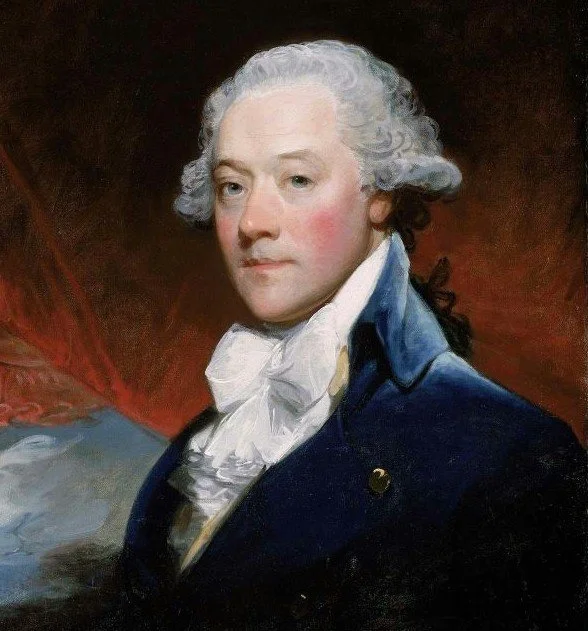Financier, entrepreneur, patriot, and legislator, James Swan spent a quarter of his life in custody over a minor dispute. (Photo credit: portrait of Swan by Gilbert Stuart in Boston’s Museum of Fine Arts.)
Read MoreHow James Swan Helped America
A Principled Patriot
By Lawrence W. Reed
If you’re an aspiring biographer and looking for a forgotten hero to write about, here’s my recommendation: James Swan. If you time it right, and the book comes out next summer, you could capitalize on the national interest in Americana as the country celebrates its 250th birthday. (See “Happy Birthday, Freedom!”: https://www.freesocietycoalition.org/readings).
Swan was a remarkable figure in America’s formative years, about whom remarkably little has been written. I found two articles, referenced below, but no biographies. He deserves a full one. Two hundred and thirty years ago on this date in 1795—July 9—he did the new country an enormous favor, one that ought to be remembered.
Born in Scotland in 1754, Swan emigrated to the British colony of Massachusetts as a boy. He wasn’t even 20 yet when he joined the Sons of Liberty, the organization of patriots that often promoted civil disobedience against London’s rule. Swan dressed as a Mohawk Indian and help dumped tea into Boston’s harbor in the famous Tea Party of 1773. Two years later he fought at the Battle of Bunker Hill, where he was wounded twice. He generously supported the Continental Army with money he earned in real estate and as an apprentice in a Boston firm that imported nautical books and devices. During the conflict with the mother country, he also served in the Massachusetts legislature and on the Board of War, which assisted the Congress in obtaining supplies for the troops.
This man’s friends included many of the best-known names of the era, including George Washington, Sam Adams, Paul Revere, Thomas Jefferson, Marquis de Lafayette (https://tinyurl.com/3cdnub8u) and Joseph Warren (https://tinyurl.com/4rz4ar7r).
If he had done nothing more than what I’ve told you so far, he would deserve appreciation from every American who values what the courageous founding generation achieved.
Fast forward to 1795. The Constitution had been adopted in 1789 and George Washington was serving his second term as President. James Swan had taught himself French and moved to Paris, where he started a profitable enterprise brokering the sale of French luxury goods to Americans. Britain and France had been at war since 1793, and the French were desperate for cash with which to buy food and war materials.
America still owed France a ton of money for loans she granted us during the War for Independence—the equivalent of about 38 million in today’s dollars. Swan saw an opportunity. He negotiated a deal with U.S. Treasury officials whereby he would pay off the remaining debt to the French in exchange for interesting-bearing U.S. bonds. Swan paid the French and then for a modest profit, he sold the bonds to private investors in America and even Britain. In a single stroke, America’s entire debt to a foreign government, a lingering embarrassment, was gone.
The last chapter of Swan’s life was nothing less than, shall we say, highly unusual. At the age of 54, he found himself behind bars, as explained here by the New England Historical Society:
On a return visit to France in 1808, Swan was accused of failing to pay a reasonably insignificant debt. He insisted he didn’t owe the money. The French courts disagreed, however, and had him imprisoned. Swan instructed his wife not to repay the debt. Instead, she funneled him a small fortune so that he had a luxurious lifestyle throwing large parties at his prison apartment. If his enemies thought Swan would yield, they were wrong. He remained in his “prison” for 22 years.
Swan died shortly after his release in 1830, at the age of 76.
Financier, entrepreneur, patriot, and legislator, James Swan spent a quarter of his life in custody over a minor dispute. Add “man of principle” to his many attributes. I’ll be among the first to buy a biography of him after one of you readers writes it.
(Note: Another noteworthy but largely forgotten patriot of the period was America’s first economist, Pelatiah Webster. See link to my article about him, below).
Sources and additional information:
James Swan: The Man Who Financed Two Revolutions (New England Historical Society): https://tinyurl.com/2jztmmdc
James Swan, Agent of the French Republic, 1794-96 by Howard C. Rice: https://www.jstor.org/stable/360316
Pelatiah Webster: America’s Adam Smith and a Forgotten Founder by Lawrence W. Reed:
https://fee.org/articles/pelatiah-webster-america-s-adam-smith-and-a-forgotten-founder/
#####
(Lawrence W. Reed is President Emeritus, Humphreys Family Senior Fellow and Ron Manners Global Ambassador for Liberty at the Foundation for Economic Education in Atlanta, Georgia. He blogs at www.lawrencewreed.com.)

